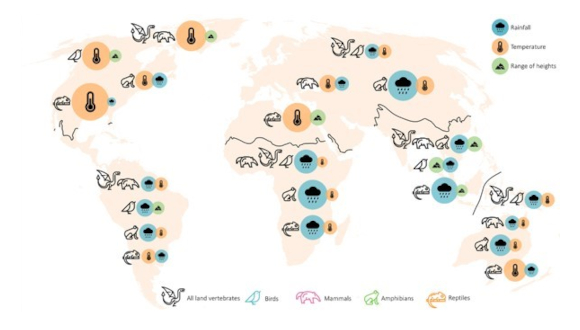TAU study finds that most biodiversity is found in rainy regions

But more reptiles are found in warmer regions regardless of rainfall, researchers say
Support this researchIn the most comprehensive study to this date on species richness of land vertebrates, an international research group led by Tel Aviv University (TAU) and Ben-Gurion University of the Negev explored patterns in the number of species all across the world using comprehensive data for tens of thousands of species of amphibians, birds, mammals, and reptiles. The researchers highlighted again the dominance of tropical regions, close to the equator, as centers of high biodiversity.
When investigating these patterns, they found that the combination of climate and topography was key in explaining them. However, while larger amounts of rainfall contribute to higher richness for amphibians, birds, and mammals, more reptiles are found in warmer regions regardless of rainfall. Patterns are even more complex as species numbers increase with rainfall almost everywhere in the world, but in cold regions temperature has a more dominant effect.
The research was led by PhD student Tal Raz and Professor Shai Meiri of TAU’s School of Zoology at the George S. Wise Faculty of Life Sciences and the Steinhardt Museum of Natural History, along with Professor Uri Roll of the Mitrani Department of Desert Ecology at Ben-Gurion University of the Negev. The research encompassed 5,983 amphibian, 9,630 avian, 5,004 mammal, and 8,939 reptile species and was published on December 8, 2023, in the Journal of Zoology.
“Until recently, we didn’t have enough data on where land vertebrates are found and thus on how many species are actually found in different areas of the world,” Raz says. “Now we have detailed data for reptiles, which we made available, along with publicly available data for other land vertebrate groups. This allows us to accurately study global patterns and how they relate to the environment.
“The relationship between temperature, precipitation, and topography in shaping ecosystems is fascinating. In regions where environmental factors are diverse, they tend to have a more pronounced influence on the number of species. In Africa, for instance — where temperatures are quite high all over — the varying rainfall plays a crucial role in determining the number of species. In Eurasia, both temperature and rainfall are highly diverse, making them both influential for species richness. But with all that, amphibians never forget their connection to rainfall, and reptiles hold onto their affinity for warmth.”
The researchers found that reptiles have a slightly different species-richness pattern that is more influenced by temperature and less by rainfall. Professor Meiri says that “reptiles can do with very little water, because their metabolism is much slower compared to birds and mammals and because, unlike amphibians, they have highly efficient mechanisms to prevent water loss. But reptiles are highly sensitive to temperatures and cannot readily function in cold regions. Therefore, we see relatively high numbers of reptiles in deserts worldwide, where mammals, birds and, especially, amphibians, are scarce.
“In recent years we have made tremendous efforts to map the global distributions of about 12,000 species of reptiles as part of the Global Assessment of Reptile Distributions,” Professor Meiri adds. “Such efforts enable us to ask such broad-scale fundamental questions regarding the ecology and evolution of life on our planet.”
“We live in an age of the biodiversity crisis,” Professor Roll concludes. “If trends continue as they are, many of the plants and animals that share the Earth with us will not be here by the end of the 21st century due to destruction of their habitats, climate change, and other human effects. A better understanding of where biodiversity is found, and why we find it there, is fundamental for our efforts to conserve it.”